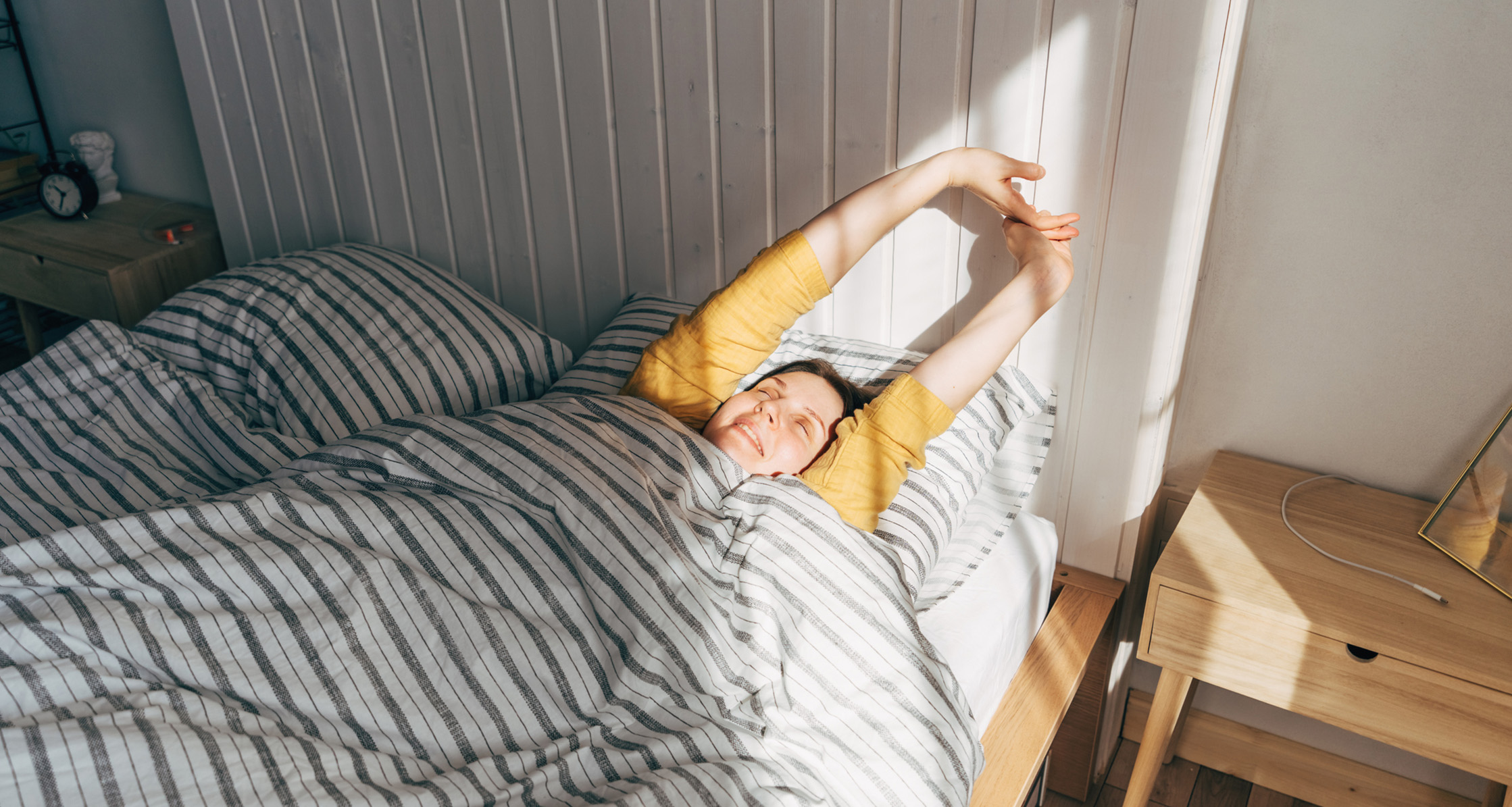Getting enough quality sleep can help protect your mental and physical health, improve your quality of life and ensure your safety.
Your body needs sleep, just like it needs food, water and air. But many of us don’t prioritize sleep like we should. Some people take pride in their ability to get a few hours of sleep and go about their day. Others believe that grabbing an extra cup of coffee or a couple of energy drinks is enough to get them through the day.
If this sounds like you, you’re not alone. According to the Centers for Disease Control and Prevention (CDC), about 1 in 3 adults report not getting enough rest or sleep every day. Maybe you think you’re functioning well or that your body’s used to it, but it’s a myth that you can get by on little sleep without negative effects. When you don’t get enough sleep, it can impact your mental and physical health in many ways.
Learn more about how sleep affects your health and check out some tips and resources for making sure you get the sleep your health deserves.
How Does a Lack of Sleep Affect My Health?
According to the National Institutes of Health (NIH), not getting enough quality sleep can affect your health in many ways, both in the short term and in long term, serious ways. Short-term effects can include:
- Drowsiness
- Irritability
- Reduced alertness
- Poor motor skills
- Difficulty focusing
- Trouble making decisions
- Trouble remembering things
- Difficulty managing your emotions and behavior
- Slower reaction time
- Lack of motivation
Most of us have probably experienced at least some of these effects. Even after just one or two bad nights of sleep, you may feel irritable or drowsy. You may feel less productive at work or more emotional about things that happen throughout your day.
But inadequate sleep over a longer period of time can have more serious health consequences. Research suggests that sleep deficiency can lead to the following health issues:
- Excess body weight and an increased risk for obesity
- Increased risk for type 2 diabetes
- Increased blood pressure levels
- Increased risk for cardiovascular disease
- Increased risk for mood disorders and mental health conditions like depression and anxiety
- Higher risk of injury, with an increased chance of falling and broken bones
- Interference with the effectiveness of treatments for post-traumatic stress disorder (PTSD)
- Slower recovery from PTSD
How Does Sleep Improve My Health?
Getting enough quality sleep can help protect your mental and physical health, improve your quality of life and ensure your safety. Here are some health benefits to keep in mind:
- Improved learning, memory and problem-solving skills
- Improved cardiovascular health
- Better stress management
- Healthier weight and hunger management
- Stronger immune system and ability to fight germs and sickness
- Decreased risk for health conditions such as heart disease, high blood pressure, obesity and stroke
- Improved muscle growth and tissue recovery
How Do I Know if I’m Getting Enough Sleep?
Most adults need at least seven hours of sleep each night. If you’re not getting at least seven hours consistently, you may be sleep-deprived. To determine if you’re sleep-deprived, consider the following questions from NIH:
- Do you find yourself spacing out or missing things in a conversation?
- Do you lose focus while you’re driving?
- Do you often feel tired during the day?
- Do you doze off while watching TV?
- Do you wake up feeling tired and groggy instead of refreshed and alert?
- Do you fall asleep during meetings or while riding in a car?
- Do you space out or doze off when you’re sitting in traffic?
If you answered yes to these questions, you may be sleep-deprived. You can become sleep-deprived for a number of reasons. Maybe you’re not getting enough sleep due to a busy schedule or being overworked. Maybe you’re a new parent or caring for an aging parent during the night.
But you may also be sleep-deprived if you have a sleep disorder that’s impacting the amount or the quality of sleep you’re getting each night. According to the Department of Veterans Affairs (VA), up to 50% of Veterans enrolled in VA health care have insomnia or another sleep disorder like nightmares or obstructive sleep apnea (when your airway gets blocked repeatedly during sleep). Read more about the most common sleep disorders impacting Veterans.
How Can I Improve My Sleep?
- Stick to a consistent sleep schedule. As best you can, try to go to bed and get up at the same time each day, even on weekends or your day off. This can help your body get into a natural sleep rhythm.
- Create a good sleep environment. Experts say you should keep your room dark, cool and quiet. Falling asleep with the TV on can actually interrupt your sleep throughout the night. The blue light from your phone or the TV can make it harder for your body and mind to prepare for sleep.
- Make sleep a priority. When we’re used to getting by on little sleep, it can be easy to push it to the bottom of the list, but sleep should be a priority for your health and wellness. Instead of telling yourself “I’ll sleep later” or “I’ll catch up on the weekend,” look for ways to change your habits or schedule to get your seven hours of sleep.
- Do something relaxing before bed. Many people use screen time as a way to unwind at night but try to avoid all screens at least one hour before bed to help your body and mind relax. Instead, try reading, listening to a podcast, doing a short meditation or taking a bath.
- Get enough physical activity. According to the National Library of Medicine, regular physical activity can improve your sleep quality and reduce symptoms of a sleep disorder.
- Don’t eat or drink too much right before bed. This is especially true when it comes to alcohol and caffeine or foods high in fat or sugar. Caffeine can make it harder to fall asleep and alcohol and certain foods can disrupt your sleep because your body is busy processing them while you’re trying to sleep.
- Learn a few relaxation techniques. Meditation, deep breathing or another relaxation technique may help you slow your heart rate and calm any racing thoughts before you fall asleep.
- Consider sound therapy. If you have a loud and busy household or you live in a noisy area, consider using sound therapy to help with your sleep issues. According to VA research, using a white noise machine has proven to be an effective non-pharmacological tool to help with sleep issues. You could also try an app that provides you with a calm, consistent sound to help you sleep.
- Expose yourself to enough natural light. During the day, be sure to expose your body to light so that your internal clock knows the difference between day and night.
- Talk to your health care provider. Review all of your medications together. Disrupted sleep and insomnia can be side effects of certain medications. In addition, describe your sleep issues. If you suffer from a sleep disorder, you may need additional support to get back on track. Check out the resources below to get started.
What Support Can I Get to Help Me Sleep Better?
You and your health care provider can work together to establish what support and resources you may need to get the sleep you deserve. Treatment options from VA may include:
- VA’s cognitive behavioral therapy for insomnia, which has proven to improve sleep in 7 out of 10 people who complete treatment.
- A positive airway pressure device, which is considered the most effective treatment for obstructive sleep apnea.
- Smartphone tools and apps, including VA’s SleepEZ course and app and the Insomnia Coach app, which can help you improve sleep habits, set a sleep schedule and track your sleep behaviors.
- Sleep Check-up, which includes videos, factsheets and more related to sleep issues faced by Veterans.
A good night’s sleep shouldn’t be negotiable. It’s an essential part of a healthy body and mind!







